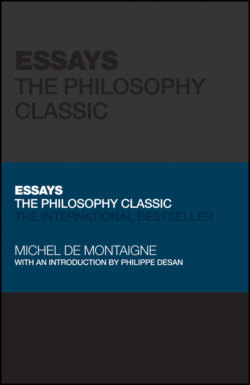Читать книгу Essays - Michel de Montaigne - Страница 11
PERSONAL OVER ABSTRACT
ОглавлениеThe Essays resembles a patchwork of personal reflections which all tend toward a single goal: to live better in the present and to prepare for death. These considerations offer a point of departure for the modern reader's assessment of his or her own life. It is indeed a book in which the “competent reader” (Book I, Chapter 23) must invest themselves in order to benefit personally and, in turn, produce their own judgments. In brief, one does not read Montaigne, one practices Montaigne.
For modern readers, an important question endures while reading the Essays: how does one systematize and synthesize the thought of an author who did not claim to write anything other than essays – literally “attempts” – bound to never quite succeed? The very form of the essay presupposes its failure, for otherwise it would no longer be an essay. But in the case of Montaigne, the quest is always more interesting and beneficial than the end.
Thinkers and philosophers are meant to create systems, not essays! Yet Montaigne elaborated a philosophy of life without precepts, mottos, or systems. His thought claims to be amorphous, or better, multisided (which does not mean powerless). Whereas Descartes and all Western thought, from the seventeenth century on, sought to develop philosophies of content, Montaigne, on the contrary, endeavored to think in terms of the form itself, or rather many different forms of thought, knowledge, and human experience. For him, these forms can only be apprehended in their relation to other thoughts, other cultures, other possible worlds (Christopher Columbus had recently “discovered” a New World).
Montaigne's true originality is to think of form itself as an organizing principle of all knowledge. All is form – or rather forms – since diversity and variety are inherent to the human condition. For example, he argues that what matters is not what is said but how we say it. Things are a matter of opinion ruled by subjectivity. He concludes his first edition of the Essays with a statement that recaps what is essential in the book:
“And there never were, in the world, two opinions alike, no more than two hairs, or two grains: their most universal quality is diversity” (Book II, Chapter 37).
For Montaigne, variety is the driving principle of humanity and its history. From the books of the ancients to the worldview of cannibals in the New World, we see the complexity of human thought and practice.
Essays, 1588 edition
